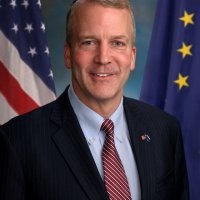The US Air Force Arctic Strategy, Alaska, and the New Arctic: A Conversation with Alaska's Senators Lisa Murkowski and Dan Sullivan
Selected Quotes
Senator Lisa Murkowski (R-AK)
- “When you think about [the Arctic Strategy] from a policy document and what they outline with their lines of effort (vigilance, power projection, cooperation, preparation), they all sound like the appropriate buzzwords that you want to have in any form of a strategy. But I’m encouraged by this Arctic Strategy because not only does it recognize the importance of the Arctic but it emphasizes Alaska's role in how we project the national power and the protection of our homeland [...]. We are going beyond the awareness, the talking about it stage, to the actual action and implementation stage, and I think that is particularly key as we look to this strategy.” (8:34 - 10:30)
- “There’s really two Arctics: there’s the North American Arctic - the Arctic that is really lacking in a lot of the modern infrastructure (everything from roads and communication abilities to just simple aspects of commerce and communication) - and you have the Scandinavian Arctic where you’ve got many many people, millions of people who are living in that part. You have infrastructures that are developed and sophisticated, you have economies that are strong and robust. And yet you look at the US Arctic in Alaska or in parts of Canada where basic water and sewer infrastructure are lacking [...]. I think it's important to understand that you have some significant differences between your North American Arctic and your Scandinavian but still the commonalities that we have, the alliances again that we can build, what we can learn from one another because of our geographies is something that shouldn’t be overlooked.” (14:58 - 17:29)
- “I think the strategy that you have seen unveiled is a strong signal that the United States and our Air Force and the Department of Defense is a real player in the Arctic. I like to remind folks though that the Arctic Strategy is not just a military strategy, that there are other component pieces to it... It is beyond just the military and the defense posture: it is from an environmental perspective, it is from a resource development perspective, it is a commercial perspective with levels of commerce coming through as we are seeing the sea lanes open. And so this is a very integral piece in this bigger picture that we are building with regards to the US’s role in the Arctic.” (19:39 - 20:50)
- “We do have a tendency to be thinking about just that quarter of the globe that surrounds us, but again recognizing the geostrategic reach that Alaska has compared to US facilities elsewhere, this is an asset that I don't think that we can overstate when we take into account our training opportunities and our ability to move out as quickly as anyone in the globe. We’re it… we hold the world because of our location.” (27:09 - 28:00)
Senator Dan Sullivan (R-AK)
- “I think it’s a very robust strategy. It's not perfect but it certainly highlights the importance of Alaska, it highlights the importance of the Arctic as a national security imperative for the Air Force. One of the things that you are starting to see in testimony (used to be a kind of classified concept but the Air Force strategy clearly highlights this) is... threats to our nation, not just to the Arctic but to the entire United States of America, exist through the Arctic. So we are starting to see the recognition and unclassified discussion of how we are not just an important area of interest because there is a Great Power Competition happening in the Arctic now but, to defend the entire homeland, you have to have a robust presence in the Arctic. And we’re finally starting to see that.” (41:23 - 42:36)
- “To me the reorientation on Great Power Competition is clearly a reorientation to the Indo-Pacific, but it's the Indo-Pacific with the Arctic essentially being part of it because it's the North Pacific. Whether it's fisheries, whether it’s national security, whether it’s new transportation routes, they all play into each other. You can’t just say ‘here's one, it stops here, and this one is less important to the other.’ They are very integrated and to me, the fact is that we are seeing the Great Power Competition play out literally on a daily basis in the Arctic because of the issues at stake, resources, strategic locations, the environment, and of course the people.” (1:05:19 - 1:06:16)
- “We have moved from a lot of talk on these issues to action. We are seeing serious action, concrete action... It benefits the national security of America and that at the end of the day is really important and the things that are finally starting to happen, we need more of it, but it's no longer just talk, its concrete action and I think that's the most important positive aspect of where we are on this Arctic inflection point right now.” (1:08:25 - 1:09:33)
Speakers


Introduction

Moderator

US Ambassador-at-Large for Arctic Affairs; Former Chair, US Arctic Research Commission
Hosted By

Polar Institute
Since its inception in 2017, the Polar Institute has become a premier forum for discussion and policy analysis of Arctic and Antarctic issues, and is known in Washington, DC and elsewhere as the Arctic Public Square. The Institute holistically studies the central policy issues facing these regions—with an emphasis on Arctic governance, climate change, economic development, scientific research, security, and Indigenous communities—and communicates trusted analysis to policymakers and other stakeholders. Read more


Indo-Pacific Program
The Indo-Pacific Program promotes policy debate and intellectual discussions on US interests in the Asia-Pacific as well as political, economic, security, and social issues relating to the world’s most populous and economically dynamic region. Read more


Canada Institute
The mission of the Wilson Center's Canada Institute is to raise the level of knowledge of Canada in the United States, particularly within the Washington, DC policy community. Research projects, initiatives, podcasts, and publications cover contemporary Canada, US-Canadian relations, North American political economy, and Canada's global role as it intersects with US national interests. Read more


Kennan Institute
The Kennan Institute is the premier US center for advanced research on Eurasia and the oldest and largest regional program at the Woodrow Wilson International Center for Scholars. The Kennan Institute is committed to improving American understanding of Russia, Ukraine, Central Asia, the South Caucasus, and the surrounding region through research and exchange. Read more


Kissinger Institute on China and the United States
The Kissinger Institute works to ensure that China policy serves American long-term interests and is founded in understanding of historical and cultural factors in bilateral relations and in accurate assessment of the aspirations of China’s government and people. Read more
